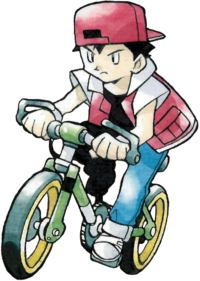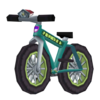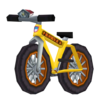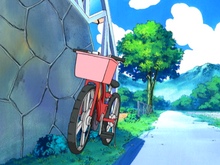Bicycle: Difference between revisions
(→Trivia) |
m (→Trivia) |
||
| Line 234: | Line 234: | ||
* In [[Generation VI]], the light of the bicycle is turned on at [[night]], but not in [[cave]]s. | * In [[Generation VI]], the light of the bicycle is turned on at [[night]], but not in [[cave]]s. | ||
* In the internal data of {{g|Omega Ruby and Alpha Sapphire}}, the Bicycle was renamed "Bike" in English, despite the item being unused in those games. This rename was carried forward in all subsequent games (despite the item being unused). This updated name was used for the first time in {{g|Brilliant Diamond and Shining Pearl}}, where the item was once again obtainable. | * In the internal data of {{g|Omega Ruby and Alpha Sapphire}}, the Bicycle was renamed "Bike" in English, despite the item being unused in those games. This rename was carried forward in all subsequent games (despite the item being unused). This updated name was used for the first time in {{g|Brilliant Diamond and Shining Pearl}}, where the item was once again obtainable. | ||
* In {{LGPE}}, the | * In {{LGPE}}, the Bike Maniac's collection in [[Cerulean City]] contains a limited edition bike that used to cost {{PDollar}}1,000,000, [[List of cross-generational references|referencing]] the Bicycle from Generation I. | ||
* In Pokémon Brilliant Diamond and Shining Pearl, the player's Cycling Style outfit will only appear in battle if they're battling on the {{rt|206|Sinnoh|Cycling Road}}. In other locations, they will appear in their Everyday Style clothes even if they were riding a bicycle before initiating a battle. | * In Pokémon Brilliant Diamond and Shining Pearl, the player's Cycling Style outfit will only appear in battle if they're battling on the {{rt|206|Sinnoh|Cycling Road}}. In other locations, they will appear in their Everyday Style clothes even if they were riding a bicycle before initiating a battle. | ||
* In the end credits of Pokémon Brilliant Diamond and Shining Pearl, the player always rides a green (if boy) or yellow (if girl) bicycle, regardless of the color they chose. | * In the end credits of Pokémon Brilliant Diamond and Shining Pearl, the player always rides a green (if boy) or yellow (if girl) bicycle, regardless of the color they chose. | ||
Revision as of 20:25, 8 May 2024
- This article is about the Key Item named Bicycle. For the bicycle models available in the Hoenn games, see Mach Bike and Acro Bike. For the bicycle model available in the Galar games, see Rotom Bike.
| |||||||||||||||||||
| |||||||||||||||||||
| |||||||||||||||||||
A Bicycle (Japanese: じてんしゃ Bicycle) is a Key Item obtained in the games to facilitate faster movement. They are usually obtained from Bicycle Shops.
In the core series games
Price
|
- In the Generation I games and Pokémon FireRed and LeafGreen, Miracle Cycle in Cerulean City sells Bicycles for $1,000,000, which is $1 more than it is possible for the player to obtain in these games. Instead, the player must use a Bike Voucher to buy one.
Effect
The Bicycle allows for faster traveling than walking, running, or skating. If the player is already riding the Bicycle, using this item causes the player to resume walking.
It also allows the player to travel on Cycling Roads: on Route 16 to 18 in Kanto, the Seaside Cycling Road on Route 110 in Hoenn, and on Route 206 in Sinnoh.
The Bicycle cannot be ridden inside buildings or if the player is accompanied by another person. In Pokémon Yellow and Pokémon HeartGold and SoulSilver, the player's walking Pokémon returns to its Poké Ball while the player is cycling.
In Generation IV, Bicycle's movement value in context of determining encounters is 70. This is higher than other types of movement, except for long grass (in Pokémon Diamond, Pearl, and Platinum, long grass value is the same as riding a bicycle, while in Pokémon HeartGold and SoulSilver it is 60 while walking and 80 while running)
Pokémon Diamond, Pearl, Platinum, Brilliant Diamond, and Shining Pearl
In these games, the Bicycle has two different gears: third and fourth gear. The player can switch between them by pressing the B button. Fourth gear is faster and allows the player to ride up muddy slopes and jump two tiles from bike ramps. Third gear is slower and only jumps one tile from ramps, but cannot ride up muddy slopes.
In Pokémon Brilliant Diamond and Shining Pearl, the player can choose between a red, blue, green, or yellow bicycle. Additionally, the player will wear the Cycling Style outfit while riding the bicycle and battling at the Cycling Road.
In Pokémon Diamond and Pearl only, bikes cannot be ridden in snow or inside gates.
Pokémon X and Y
The player can move in any direction using the Nintendo 3DS's Circle Pad. The player has a choice between a green and yellow Bicycle when they obtain it. They cannot switch bikes once they pick one, but both Bicycles are functionally identical.
Glitches
Pokémon Red, Blue, and Yellow
Due to a glitch, if the player saves at the Cycling Road and creates a new game, it will not be possible to use the Bicycle (or Surf outside of battle) anywhere in the new game until the player does any of these things for the first time: blacks out (either in battle or the overworld), uses Dig, Teleport, or Fly outside of battle, uses an Escape Rope, or enters and leaves the Cycling Road.
Description
|
Acquisition
|
Similar equipment
Mach and Acro Bikes
In Pokémon Ruby, Sapphire, and Emerald, Omega Ruby, and Alpha Sapphire, there are two different models of Bicycle: Mach Bike (which is faster than the regular Bicycle) and the Acro Bike (which is the same speed as the regular Bicycle, but can also be used to perform tricks). Both bicycles allow the player to reach places they otherwise could not.
In Generation III, the player cannot have both at the same time. They can switch models at Rydel's Cycles.
In Generation VI, the player initially needs to switch models at Rydel's Cycles as well. However, the player will be able to keep both the Mach Bike and Acro Bike together in their Bag, after the player advertises the Rydel's Cycles to three NPCs:
- Route 111 Desert: A Hex Maniac up a muddy slope to the north that requires the Mach Bike to climb.
- Route 119: A Bird Keeper at the northmost maze of bridges, requires Surf and Waterfall along with the Acro Bike.
- Battle Resort: A biking Triathlete southeast of the Pokémon Day Care.
Rotom Bike
In Pokémon Sword and Shield, the player receives the Rotom Bike. The Rotom Bike can occasionally dash to move at high speeds for short periods of time. After being upgraded with Water Mode, it can also travel on water.
Ride Pokémon
In Pokémon Sun, Moon, Ultra Sun, and Ultra Moon, several Ride Pokémon take over the role of transporting the player across the land at higher speeds, such as Tauros Charge.
In Pokémon: Let's Go, Pikachu! and Let's Go, Eevee!, the player can ride on certain walking Pokémon. Cycling Road is replaced by Pokémon Road, where Trainers are encouaged to walk with their Pokémon.
In Pokémon Legends: Arceus, the player can use some Ride Pokémon to travel faster than on foot, such as Wyrdeer.
In Pokémon Scarlet and Violet, the player can ride on the partner KoraidonS/MiraidonV after they begin their Treasure Hunt.
Gallery
Artwork
|
Sprites and models
|
In the anime
Main series
Bicycles are rarely seen in the anime, since Ash and his friends are usually seen walking for their journeys. The only time bicycles are used is when it is necessary to use them, such as on Cycling Roads, or for a faster way to get somewhere.
The first bicycle to appear was Misty's bicycle in Pokémon - I Choose You!. It was "borrowed" by Ash in order to escape from a flock of Spearow. The bike was unintentionally destroyed when Ash's Pikachu released a Thunder Shock at the Spearow. Misty later re-obtained her bike from Nurse Joy in Viridian City in Gotta Catch Ya Later.
The act of Pikachu destroying a female companion's bike became a running gag in the two following series of the anime: May's bicycle was destroyed in Get the Show on the Road! and Dawn's in Two Degrees of Separation.
Bicycles can be rented for use on Cycling Roads, as seen in The Bridge Bike Gang and One Big Happiny Family!. Some characters do own bicycles, but are rarely seen using them. For example, Professor Oak used a bicycle in The Power Of One and The Road Most Traveled! to get to Delia's house.
Barry was shown to have a bike in Gotta Get a Gible!. He said he got it in Eterna City as part of a free bicycle distribution event. The bike was eventually devoured by a wild Gible.
In The Bridge Bike Gang, Chopper's bike bears a resemblance to Zapdos.
Mallow's bike appeared in Lillie's Egg-xhilarating Challenge!.
Pokémon Origins

Red commonly used a bicycle to move around in Pokémon Origins. He was seen obtaining it at the beginning of File 2: Cubone, getting it in return for a Bike Voucher he had obtained from the Pokémon Fan Club Chairman.
In the manga

The Electric Tale of Pikachu
In Play Misty For Me, it was revealed that Misty's Bicycle, which, like in the anime, had been accidentally destroyed by Ash's Pikachu, was custom-built and worth $10,000.
Pokémon Adventures
Red, Green & Blue arc
Professor Oak used a bicycle to pursue the Pokémon that escaped from his Laboratory in Bulbasaur Come Home!.
Red participated in a cycling competition along Routes 11 and 12 in Wake Up—You're Snorlax!, using a bicycle received in exchange for a coupon he had gotten from the Pokémon Fan Club Chairman.
Yellow arc
In Victim of Venusaur, Red rode his bicycle when arriving to help Lt. Surge and Bill in their battle against Bruno on Cerise Island.
Gold, Silver & Crystal arc
Gold competed with Whitney in a bike race from Goldenrod City to the National Park in Smeargle Smudge and How Do You Do, Sudowoodo?. Gold, however, altered his Bicycle into a push scooter.
Diamond & Pearl arc
Diamond, Pearl, and Platinum received Bicycles from Rad Rickshaw as a sign of gratitude after his rescue from Team Galactic in Ring Around the Roserade II. The trio would later use their new Bicycles to travel through the Cycling Road. Rad Rickshaw was also revealed to own a tandem bike in Cautious Clefairy.
Pokémon Zensho
A Bicycle was seen inside the Miracle Cycle shop in Cerulean City.
Pokémon Newspaper Strip
In Strip 14, Delia mentioned that Ash has a bicycle.
In the TCG
- Main article: Bicycle (Plasma Storm 117)
The Bicycle was introduced as an Item card in the Pokémon Trading Card Game during the English Black & White Series (the Japanese BW Era). First released in the Cold Flare expansion, the Bicycle later debuted in the Plasma Storm expansion with both prints featuring an illustration by Toyste Beach. With the same effect as Mail from Bill from the Neo Destiny expansion, this Trainer card allows the player to draw cards until they have 4 cards in their hand.
In the magazines
Pokémon Power
- See also: Bike Voucher → Pokémon Power
In Pokémon Power #1, there is an ad on page 3 for the bicycles sold at the Bike Shop in Cerulean City. This ad mentions that the bikes are new models, and that VIN numbers are posted at dealership. The article about Cerulean City on page 10 incorrectly indicates that the player will need to obtain the full $ 1000000 value to buy a Bicycle in Pokémon Red and Blue, by displaying a game screenshot of the Bike Shop including this value and stating: "You'll need to win a lot of duels to earn enough money for a bicycle."
In Pokémon Power #2, there is an ad stating that multiple Bike Vouchers have been distributed, which can be exchanged for '98 model bikes because the store is making room for new models. The article about Vermilion City on page 6 explains how to obtain and use the Bike Voucher in Pokémon Red and Blue.
Trivia
- In the beta version of Gold and Silver, a skateboard was planned to complement the Bicycle.
- The song Bicycle (Japanese: じてんしゃ) from Generation II and HeartGold and SoulSilver is a remix of the song Goldenrod City (Japanese: コガネシティ). Furthermore, the song Bug-Catching Contest (Japanese: むしとりたいかい) from these games remixes parts of the song Cycling (Japanese: サイクリング) from Generation I.
- Like all key items from Pokémon Ruby and Sapphire, the Mach Bike and Acro Bike are present in the internal data of Pokémon FireRed and LeafGreen, but are unused. If the player obtains one (i.e. via cheating), they both function like the regular Bicycle.
- Like all key items from Pokémon FireRed and LeafGreen, the regular Bicycle is present in the internal data of Pokémon Emerald, but is unused. If attempted to be used, it has no effect.
- In Pokémon FireRed and LeafGreen, when the player attempts to enter the Cycling Road, the game does not check if the Bicycle is present in the Bag; instead, it specifically checks for the event flag indicating that player has obtained the Bicycle from Miracle Cycle. However, this makes no difference in regular gameplay, because the Bicycle (like any other Key Item in these games) is unable to be deposited in the PC, sold, or thrown away, so it remains indefinitely in the Bag after the player has obtained it.
- In Generation V, if the player runs or holds down the B Button, NPCs with bicycles will go faster.
- In Generation VI, the light of the bicycle is turned on at night, but not in caves.
- In the internal data of Pokémon Omega Ruby and Alpha Sapphire, the Bicycle was renamed "Bike" in English, despite the item being unused in those games. This rename was carried forward in all subsequent games (despite the item being unused). This updated name was used for the first time in Pokémon Brilliant Diamond and Shining Pearl, where the item was once again obtainable.
- In Pokémon: Let's Go, Pikachu! and Let's Go, Eevee!, the Bike Maniac's collection in Cerulean City contains a limited edition bike that used to cost $1,000,000, referencing the Bicycle from Generation I.
- In Pokémon Brilliant Diamond and Shining Pearl, the player's Cycling Style outfit will only appear in battle if they're battling on the Cycling Road. In other locations, they will appear in their Everyday Style clothes even if they were riding a bicycle before initiating a battle.
- In the end credits of Pokémon Brilliant Diamond and Shining Pearl, the player always rides a green (if boy) or yellow (if girl) bicycle, regardless of the color they chose.
In other languages
| ||||||||||||||||||||||||||||||||||||||||||||||
See also
- List of Key Items (Generation I)
- List of Key Items (Generation II)
- List of Key Items (Generation III)
- List of Key Items (Generation IV)
- List of Key Items (Generation V)
- List of Key Items (Generation VI)
- List of Key Items (Generation VIII)

|
This item article is part of Project ItemDex, a Bulbapedia project that aims to write comprehensive articles on all items. |











